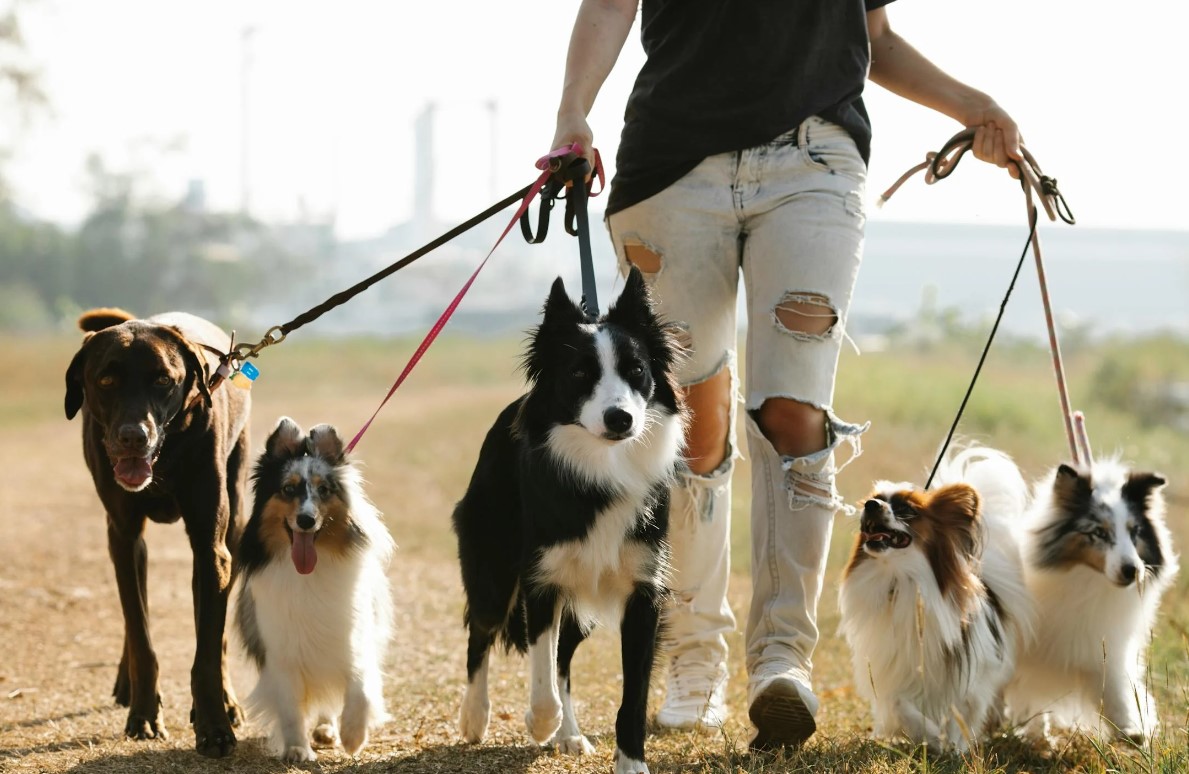Legal Requirements & Licenses Needed For Dog Walking Business in the UK
Starting a dog walking business in the UK can be a rewarding venture for animal lovers. However, it is essential to understand and comply with the legal requirements and obtain the necessary licenses to operate legally and responsibly. This guide outlines the critical legal considerations and licenses needed for starting a dog walking business in the UK.
Business Registration and Structure for Dog Walking Business
Choosing a Business Structure
The first step in setting up your dog walking business is deciding on the appropriate business structure. You can choose to operate as a sole trader, partnership, or limited company. Each structure has its legal implications and tax obligations.
- Sole Trader: This is the simplest and most common structure for small businesses. You are personally responsible for the business’s debts, and you must register as self-employed with HMRC.
- Partnership: If you are starting the business with someone else, you might choose a partnership. This involves sharing the responsibilities, profits, and liabilities of the business.
- Limited Company: This is a separate legal entity from you personally. It provides limited liability protection but comes with more regulatory requirements and administrative responsibilities.
Registering Your Business with HMRC
Once you have decided on the business structure, you need to register your business with HM Revenue and Customs (HMRC). This registration is crucial for tax purposes and ensures that you comply with all legal requirements for operating a business in the UK. As a sole trader, you must register for Self Assessment and file an annual tax return. If you choose to form a limited company, you must register with Companies House and submit annual accounts and confirmation statements.
Licensing and Permits for Dog Walking Business
Local Council Dog Walking Licenses
Some local councils in the UK may require dog walkers to obtain specific licenses to operate in certain areas. This is especially common in urban areas with high traffic and parks. It is essential to check with your local council to understand the requirements and apply for any necessary permits. These licenses help ensure that dog walkers adhere to local regulations regarding the number of dogs walked at one time, waste disposal, and use of public spaces.
Public Liability Insurance
Public liability insurance is vital for any dog walking business. This insurance covers you in case a dog in your care causes injury to a third party or damages property. It provides peace of mind and financial protection against potential claims. In addition to public liability, consider other insurance types such as professional indemnity insurance, which covers legal costs if a client claims your services were inadequate, and employer’s liability insurance if you have staff.
Animal Boarding Establishment License
If you plan to offer additional services such as dog boarding or daycare, you may need an animal boarding establishment license. This license ensures that your facilities meet the required standards for animal welfare and safety. The requirements include providing adequate space, ventilation, exercise, and supervision. You will need to pass an inspection by the local council to obtain this license.

Health and Safety Regulations for Dog Walking Business
Health and Safety Obligations
As a dog walker, you have a duty of care to ensure the safety of the dogs in your care and the public. This includes following health and safety regulations, such as using appropriate equipment (like sturdy leashes and harnesses) and adhering to safe handling practices. You must be aware of any allergies, medical conditions, and behavioral issues of the dogs you walk.
Risk Assessment and Management
Conducting a risk assessment is crucial to identify potential hazards and implement measures to mitigate risks. This process involves evaluating the walking routes, assessing the behavior of the dogs, and ensuring that you are prepared for emergencies. Consider factors like traffic, other animals, and environmental hazards. Develop a plan for dealing with emergencies, such as a dog getting loose or injured.
First Aid Training and Certifications
Having first aid training for both humans and animals is highly recommended. This training equips you with the skills to handle minor injuries and emergencies, ensuring the well-being of the dogs and your clients. Look for courses that cover CPR for pets, treating wounds, and managing shock. Certification from a recognized body can also boost your credibility with clients.
Animal Welfare Act Compliance for Dog Walking Business
Understanding the Animal Welfare Act 2006
The Animal Welfare Act 2006 sets out the legal responsibilities of anyone responsible for a pet. As a dog walker, you must ensure that the dogs in your care are treated humanely and their welfare needs are met. This includes providing a suitable environment, proper diet, and allowing them to exhibit normal behavior patterns.

Ensuring the Welfare of Dogs in Your Care
Meeting the welfare needs of the dogs includes providing adequate exercise, food, water, and shelter. It also involves monitoring their health and behavior, and seeking veterinary care when necessary. Regularly check for signs of distress or illness and take appropriate action. Keep detailed records of each dog’s health and any incidents that occur during walks.
Record-Keeping Requirements for Dog Welfare
Maintaining accurate records of the dogs in your care is essential. This includes details of their health, behavior, and any incidents that occur during walks. Good record-keeping helps demonstrate compliance with legal requirements and ensures the welfare of the dogs. Record-keeping also helps you track any changes in a dog’s behavior or health over time, which can be vital for early detection of issues.
Data Protection and Privacy for Dog Walking Business
GDPR Compliance for Client Information
As a business owner, you must comply with the General Data Protection Regulation (GDPR) when handling client information. This includes obtaining consent for collecting personal data, securely storing data, and ensuring clients’ privacy rights are respected. Clients have the right to know what information you hold about them and how it is used.
Secure Storage and Handling of Personal Data
Implementing secure storage and handling practices for personal data is crucial. This includes using password-protected systems, regularly updating security measures, and ensuring that only authorized personnel have access to client information. Regularly review your data protection policies and practices to ensure ongoing compliance with GDPR.
Professional Training and Certifications For Dog Walking Business
Relevant Courses and Certifications for Dog Walking
While formal qualifications are not mandatory, completing relevant courses and certifications can enhance your credibility and skills as a dog walker. Consider courses in animal behavior, dog handling, and pet first aid. Organizations like the National Association of Pet Sitters & Dog Walkers (NARPS UK) offer training and certification programs.
Importance of Continuous Professional Development
Staying updated with the latest practices and trends in the industry is essential. Continuous professional development ensures that you provide high-quality services and adhere to best practices in dog care. Attend workshops, seminars, and other training opportunities to enhance your knowledge and skills.
Marketing and Advertising Regulations for Dog Walking Business
Advertising Standards and Regulations
When promoting your dog walking business, it is essential to comply with advertising standards and regulations. Ensure that your advertisements are truthful, non-misleading, and accurately represent the services you offer. Be transparent about your qualifications, experience, and any endorsements.
Transparent Pricing and Service Descriptions
Providing clear and transparent pricing and service descriptions helps build trust with your clients. Ensure that clients understand what services are included, the costs involved, and any additional charges that may apply. Clearly outline your terms and conditions, including cancellation policies and payment terms.
Taxation and Financial Management for Dog Walking Business
Tax Obligations and Filing Requirements
As a business owner, you must meet your tax obligations, including filing annual tax returns and paying any due taxes. Keeping accurate financial records and understanding your tax responsibilities is essential for compliance. Depending on your business structure, you may need to pay income tax, National Insurance, and VAT.

Keeping Accurate Financial Records
Maintaining detailed financial records helps you manage your business effectively and ensures that you comply with legal requirements. This includes tracking income, expenses, and keeping receipts and invoices. Use accounting software or hire an accountant to help manage your finances and ensure you meet all your tax obligations.
Conclusion
Starting a dog walking business in the UK involves understanding and complying with various legal requirements and obtaining the necessary licenses. Ensuring that you meet these requirements not only helps you operate legally but also builds trust with your clients and ensures the welfare of the dogs in your care. Staying informed about legal obligations, maintaining high standards of care, and continuously improving your skills are key to running a successful dog walking business.
Related Article: How to Start a Dog Walking Business in the UK?
FAQs
1. What insurance do I need for a dog walking business?
You need public liability insurance to cover potential claims if a dog in your care causes injury or damage to property. Additionally, consider professional indemnity insurance and employer’s liability insurance if you have staff.
2. Do I need a license to walk dogs in public parks?
Some local councils may require specific licenses for dog walking in public parks. Check with your local council for any necessary permits and adhere to the regulations in your area.
3. How can I ensure the welfare of the dogs I walk?
Ensure the welfare of dogs by meeting their needs for exercise, food, water, and shelter, monitoring their health, and seeking veterinary care when necessary. Also, adhere to the guidelines set out in the Animal Welfare Act 2006.
4. What should be included in a dog walking contract?
A dog walking contract should include details of the services provided, pricing, terms and conditions, responsibilities of both parties, cancellation policies, and emergency procedures. It should also cover confidentiality and data protection agreements.
5. Are there any specific training requirements for dog walkers?
While formal qualifications are not mandatory, completing relevant courses in animal behavior, dog handling, and pet first aid is recommended. Continuous professional development through workshops and seminars can also be beneficial.







